
 |
|
|
|
|
|
|
 The
first line-up of Gillan was hurriedly assembled in July 1978. Colin
Towns' 'Fighting Man' demo had mapped out a hard rock direction
for the band to follow, and it fell upon him to find the musicians
to complete the new line-up. The
first line-up of Gillan was hurriedly assembled in July 1978. Colin
Towns' 'Fighting Man' demo had mapped out a hard rock direction
for the band to follow, and it fell upon him to find the musicians
to complete the new line-up.
Session drummer
Liam Genocky, bass player John McCoy, and guitarist Richard Brampton
were chosen from his list of contacts. At McCoy's suggestion his old ZZebra bandmate Steve Byrd was brought
in to replace Brampton. Towns then set to work writing music for
the band's first album, which was recorded just before their live
debut at the Reading Festival on August 16th 1978. They were listed
there as the Ian Gillan Band, but in line with the new no-frills
policy the name was soon pared down to plain old Gillan.
Genocky was
unable to continue in the band due to prior commitments with Gerry
Rafferty, but a new drummer was quickly found in the shape of Pete
Barnacle, who had previously played alongside Byrd in Sonja Kristina's
band. (photo:
John McCoy with Liam Genocky)
|
|
|
|
|
|
|
|
 |
|
| |

 |
|
|
|
|
|
|
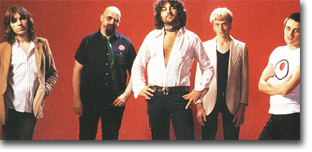 The
'Gillan' album appeared in September 1978; and was an impressive
piece of work; fierce, heavy, well performed and exuberant. It
was only released in Japan, Australia and New Zealand, but the
album sold well in the UK as an import, aided by positive press
reviews and the presence of the band gigging busily, performing
the new music in all of its raw, ramshackle glory. Ritchie Blackmore
was impressed enough to join them on stage at the London Marquee
Club in December 1978, and shortly afterwards asked Gillan to
join him in Rainbow, but with success on his own terms beckoning,
Ian decided to enter the new year with his own band. The
'Gillan' album appeared in September 1978; and was an impressive
piece of work; fierce, heavy, well performed and exuberant. It
was only released in Japan, Australia and New Zealand, but the
album sold well in the UK as an import, aided by positive press
reviews and the presence of the band gigging busily, performing
the new music in all of its raw, ramshackle glory. Ritchie Blackmore
was impressed enough to join them on stage at the London Marquee
Club in December 1978, and shortly afterwards asked Gillan to
join him in Rainbow, but with success on his own terms beckoning,
Ian decided to enter the new year with his own band.
In March
1979 they returned to the studio to prepare an updated version
of their album for the UK. Four months later they emerged with
a new album and two new members. Barnacle and Byrd were out, replaced
by Ian's old Episode Six bandmate Mick Underwood on drums, and
Bernie Torme on guitar. The latter had supported Gillan with his
own heavy flash-punk trio, and had impressed Ian with his wild
guitar style.
(photo:
Colin Towns, John McCoy, Ian Gillan, Steve Byrd, Pete Barnacle)

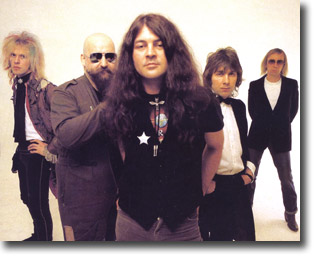 The
new Gillan line-up made a considerable impact, first on UK concert
audiences and then the charts. Their debut show was at the London
Marquee Club on July 10th 1979, preceding an appearance at the
Reading Festival in August, and by October they had built up
a strong enough head of steam to send their first UK album,
'Mr.Universe', up to #11 in the charts. The album continued
in the energetic vein of its predecessor, despite being hampered
by a muddy production sound, which was to become a recurring
problem. That, allied with the band's rumbustuous, almost punky
live shows, and their constant touring somehow meant they never
achieved the rock god status of Deep Purple split group contemporaries
Rainbow and Whitesnake, but that's not where Ian saw himself. The
new Gillan line-up made a considerable impact, first on UK concert
audiences and then the charts. Their debut show was at the London
Marquee Club on July 10th 1979, preceding an appearance at the
Reading Festival in August, and by October they had built up
a strong enough head of steam to send their first UK album,
'Mr.Universe', up to #11 in the charts. The album continued
in the energetic vein of its predecessor, despite being hampered
by a muddy production sound, which was to become a recurring
problem. That, allied with the band's rumbustuous, almost punky
live shows, and their constant touring somehow meant they never
achieved the rock god status of Deep Purple split group contemporaries
Rainbow and Whitesnake, but that's not where Ian saw himself.
Recording
wise, matters were still rather confusing for some fans. The
UK 'Mr Universe' was made up of two tracks lifted unchanged
from the Japanese 'Gillan' album, three which had been re-recorded
with Torme and Underwood, and four new ones. In turn, to avoid
repeating already released tracks on the Japanese edition of
'Mr.Universe', four new tracks were recorded for that version.
Despite setbacks (including their UK label Acrobat going bust
just as 'Mr.Universe' was climbing the charts), the band were
on a roll, helped in part by the nascent New Wave Of British
Heavy Metal movement, which brought along legions of new rock
fans eager to follow rock acts such as Gillan (and also to delve
into the back catalogues of bands such as Deep Purple, who were
now increasingly being labelled 'legendary' when mentioned in
the music press). The excellent 'Glory Road' album was carried
on a wave to #3 in August 1980, kept off the top by the latest
Deep Purple compilation 'Deepest Purple'. In October 1980 a
tongue-in-cheek and kicked about reworking of Elvis' 'Trouble'
became Gillan's first hit single, and opened up a mainstream
audience who now witnessed the band appearing regularly on BBC
TV's 'Top Of The Pops'. Gillan avoided heavy metal stereotyping
by hamming it up for the cameras, with John McCoy bouncing around
like an enormous bald headed road drill, Bernie Torme, a punk
Hendrix pirate complete with eyepatch, Colin Towns in wraparound
shades and op-art fashions, and Mick Underwood, a tetchy uncle
in mirror sunglasses.
1981
proved prolific, to say the least. A barrage of multi-format singles
continued, some serious, others less so, with 'New Orleans' climbing
highest, followed by a new album 'Future Shock' reaching #2 in the
album charts in April, and a huge number of TV appearances and tour
dates. In June, Bernie Torme had had enough, and jumped ship when
the band were supposed to return home in the middle of a German
tour to perform 'No Laughing In Heaven' on Top Of The Pops. In double
quick time Janick Gers was drafted in from support act White Spirit,
and with barely a pause for breath the touring and recording continued
unabated.
(photo: Bernie Torme, John McCoy, Ian Gillan, Colin Towns, Mick
Underwood)
|
|
|
|
|
|
|
|
 |
|
| |

The
final incarnation of the band broke the spell of the band's
artistic and commercial popularity. Despite a more controlled
approach in the recording studio the spirit was beginning to
ebb away, and Ian was ready to pull the plug by the end of 1982.
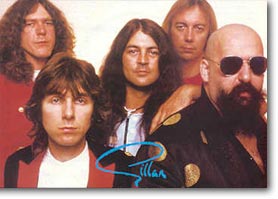 Gers
contributed successfully and in understated fashion to the UK
#12 album 'Double Trouble', a very commendable studio album
spoilt by the addition of an execrably mixed 1981 live set from
Gillan's new second home: the Reading Festival. On stage the
band had certainly lost some of its highly individual charm,
with Gers' sub-Blackmore stage antics being met with some derision.
'Sounds' magazine's review of his PA climbing exploits at Castle
Donnington in 1982 concluded "what a showman, what a technician,
what a wally...". The band's studio work also came back to earth
with a bump, as they tried to polish their studio sound, resulting
in the comparatively unsuccessful 'Magic' album in 1982, and
a final, missfiring single in the shape of the AOR sounding
'Long Gone' (although the glorious b-side 'Fiji' showed they
could still turn on the magic). Gers
contributed successfully and in understated fashion to the UK
#12 album 'Double Trouble', a very commendable studio album
spoilt by the addition of an execrably mixed 1981 live set from
Gillan's new second home: the Reading Festival. On stage the
band had certainly lost some of its highly individual charm,
with Gers' sub-Blackmore stage antics being met with some derision.
'Sounds' magazine's review of his PA climbing exploits at Castle
Donnington in 1982 concluded "what a showman, what a technician,
what a wally...". The band's studio work also came back to earth
with a bump, as they tried to polish their studio sound, resulting
in the comparatively unsuccessful 'Magic' album in 1982, and
a final, missfiring single in the shape of the AOR sounding
'Long Gone' (although the glorious b-side 'Fiji' showed they
could still turn on the magic).
In
December the band came to a sudden close, when Ian Gillan announced
that he was having to take a break to rest his voice. The manner
of the dissolution lead to ongoing bitterness from McCoy and
Underwood (the former released a single shortly afterwards called
'Because You Lied'). Towns went on to huge success as a jazz,
TV and film soundtrack composer, while Gers eventually ended
up in Iron Maiden. At their best, the Gillan band's music is
some of the very strongest and most imaginative of any of the
Purple split bands, and a major reappraisal is long overdue.
(photo:
Janick Gers, Colin Towns, Ian Gillan, Mick Underwood, John McCoy)
..... 1978-82 UK Gillan Discography ....
....
Notable Post 1982 Gillan CD Releases ....
 |
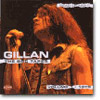 THE BBC TAPES, Volume 1 THE BBC TAPES, Volume 1
RPM Records - Live album
BBC recordings from the 1979 Reading Festival and a 1979 In Concert show. The album was rereleased on Angel Air.
SLEEPING
ON THE JOB mp3 |
 |
|
 |
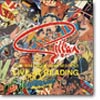 Live At Reading Live At Reading
Raw Fruit Records - Live album
Six live tracks from the 1980 Reading Festival. Deleted. Four tracks are now on the Future Shock remaster and the singles box.
VENGEANCE
mp3 |
 |
|
 |
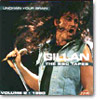 THE BBC TAPES, VOLUME 2 THE BBC TAPES, VOLUME 2
RPM Records - Live album
BBC recordings from a wonderful 1980 In Concert show, plus a studio session. The album was rereleased on Angel Air.
NERVOUS
mp3 |
 |
|
 |
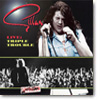 triple trouble triple trouble
Edsel - Live album
3x CD live collection. Disc one is from the Rainbow Theatre 5th March 1981, disc two is the Reading Festival 1981, and disc three includes a 1982 BBC studio session plus live tracks from Nottingham 4th March 1981.
DPAS ONLINE
STORE |
 |
|
 |
|
Angel
Air Records
Since the late 1990s the Angel Air label have released
a number of additional Gillan live and studio out-take
CDs, none authorised by Ian, who on his website has described
the releases as "very doubtful and totally unapproved.
Don't waste your money."
 Gillan
1978-82 CDs on Angel Air : Live Tokyo, October 1978: soundboard recording.
On The Rocks: live in Germany, June 1981. Live
Wembley 17th December 1982: soundboard recording.
Mutually Assured Destruction, Glasgow 1982: radio
recording from Radio Clyde. (also released as 'The
River Sessions' on the River Records label). The
Gillan Tapes Vol.1, The Gillan Tapes Vol.2, The Gillan
Tapes Vol.3 : Studio and live tracks. The studio
offerings include a few rough out-takes but in the main
sound identical to released versions. The
live tracks are poor quality. (The only recordings to
have received Ian Gillan's approval, while they were
on the RPM label, are the two live BBC sets, which are
now available together as a double set titled Live
at The BBC 79/80. Gillan
1978-82 CDs on Angel Air : Live Tokyo, October 1978: soundboard recording.
On The Rocks: live in Germany, June 1981. Live
Wembley 17th December 1982: soundboard recording.
Mutually Assured Destruction, Glasgow 1982: radio
recording from Radio Clyde. (also released as 'The
River Sessions' on the River Records label). The
Gillan Tapes Vol.1, The Gillan Tapes Vol.2, The Gillan
Tapes Vol.3 : Studio and live tracks. The studio
offerings include a few rough out-takes but in the main
sound identical to released versions. The
live tracks are poor quality. (The only recordings to
have received Ian Gillan's approval, while they were
on the RPM label, are the two live BBC sets, which are
now available together as a double set titled Live
at The BBC 79/80.
|
 |
|
... Gillan Video....
 |
 LIVE EDINBURGH 1980 LIVE EDINBURGH 1980
Angel Air - DVD
20 minute live TV performance from Edinburgh, 5th February 1981. Good quality. Also included is a very ropey quality off-air recording of a live TV performance from Japan in October 1978.
|
 |
|
 |
 THE GLORY YEARS THE GLORY YEARS
Eagle Vision - DVD
Excellent collection of TV performances from 1980-81, including 40 minutes of a gig at Oxford Poly, 18th Feb 1981, and four mimes from Top Of The Pops.
DPAS ONLINE STORE • DPAS REVIEW |
 |
|
 |
 THE SINGLES • THE PROMO VIDEOS THE SINGLES • THE PROMO VIDEOS
Edsel - CD / DVD box set
11 CD singles in reproduction UK sleeves, with 1xDVD containing 7 promo videos made between 1980-82. The only Gillan promo missing is a 1979 one for Mr Universe.
DPAS REVIEW |
 |
|
 |
| The
only other 1978-82-era Gillan material officially released on video
is a mime to 'Living For The City' from BBC TV's Top Of The
Pops, which was included in the 1980s VHS compilation: 'Top
Of The Pops' on BBC Video. The promo for 'Living For The City' originally appeared on a VHS compilation called
'Original Chart Busters Video Pop' and has since been included on 'The Singles..' box. There may have been other inclusions on
heavy metal magazine videos in the late 80s. |
 |
|
.... Gillan,
Further Reading ....
|








 The
first line-up of Gillan was hurriedly assembled in July 1978. Colin
Towns' 'Fighting Man' demo had mapped out a hard rock direction
for the band to follow, and it fell upon him to find the musicians
to complete the new line-up.
The
first line-up of Gillan was hurriedly assembled in July 1978. Colin
Towns' 'Fighting Man' demo had mapped out a hard rock direction
for the band to follow, and it fell upon him to find the musicians
to complete the new line-up.


 The
'Gillan' album appeared in September 1978; and was an impressive
piece of work; fierce, heavy, well performed and exuberant. It
was only released in Japan, Australia and New Zealand, but the
album sold well in the UK as an import, aided by positive press
reviews and the presence of the band gigging busily, performing
the new music in all of its raw, ramshackle glory. Ritchie Blackmore
was impressed enough to join them on stage at the London Marquee
Club in December 1978, and shortly afterwards asked Gillan to
join him in Rainbow, but with success on his own terms beckoning,
Ian decided to enter the new year with his own band.
The
'Gillan' album appeared in September 1978; and was an impressive
piece of work; fierce, heavy, well performed and exuberant. It
was only released in Japan, Australia and New Zealand, but the
album sold well in the UK as an import, aided by positive press
reviews and the presence of the band gigging busily, performing
the new music in all of its raw, ramshackle glory. Ritchie Blackmore
was impressed enough to join them on stage at the London Marquee
Club in December 1978, and shortly afterwards asked Gillan to
join him in Rainbow, but with success on his own terms beckoning,
Ian decided to enter the new year with his own band.




 The
new Gillan line-up made a considerable impact, first on UK concert
audiences and then the charts. Their debut show was at the London
Marquee Club on July 10th 1979, preceding an appearance at the
Reading Festival in August, and by October they had built up
a strong enough head of steam to send their first UK album,
'Mr.Universe', up to #11 in the charts. The album continued
in the energetic vein of its predecessor, despite being hampered
by a muddy production sound, which was to become a recurring
problem. That, allied with the band's rumbustuous, almost punky
live shows, and their constant touring somehow meant they never
achieved the rock god status of Deep Purple split group contemporaries
Rainbow and Whitesnake, but that's not where Ian saw himself.
The
new Gillan line-up made a considerable impact, first on UK concert
audiences and then the charts. Their debut show was at the London
Marquee Club on July 10th 1979, preceding an appearance at the
Reading Festival in August, and by October they had built up
a strong enough head of steam to send their first UK album,
'Mr.Universe', up to #11 in the charts. The album continued
in the energetic vein of its predecessor, despite being hampered
by a muddy production sound, which was to become a recurring
problem. That, allied with the band's rumbustuous, almost punky
live shows, and their constant touring somehow meant they never
achieved the rock god status of Deep Purple split group contemporaries
Rainbow and Whitesnake, but that's not where Ian saw himself. 

 Gers
contributed successfully and in understated fashion to the UK
#12 album 'Double Trouble', a very commendable studio album
spoilt by the addition of an execrably mixed 1981 live set from
Gillan's new second home: the Reading Festival. On stage the
band had certainly lost some of its highly individual charm,
with Gers' sub-Blackmore stage antics being met with some derision.
'Sounds' magazine's review of his PA climbing exploits at Castle
Donnington in 1982 concluded "what a showman, what a technician,
what a wally...". The band's studio work also came back to earth
with a bump, as they tried to polish their studio sound, resulting
in the comparatively unsuccessful 'Magic' album in 1982, and
a final, missfiring single in the shape of the AOR sounding
'Long Gone' (although the glorious b-side 'Fiji' showed they
could still turn on the magic).
Gers
contributed successfully and in understated fashion to the UK
#12 album 'Double Trouble', a very commendable studio album
spoilt by the addition of an execrably mixed 1981 live set from
Gillan's new second home: the Reading Festival. On stage the
band had certainly lost some of its highly individual charm,
with Gers' sub-Blackmore stage antics being met with some derision.
'Sounds' magazine's review of his PA climbing exploits at Castle
Donnington in 1982 concluded "what a showman, what a technician,
what a wally...". The band's studio work also came back to earth
with a bump, as they tried to polish their studio sound, resulting
in the comparatively unsuccessful 'Magic' album in 1982, and
a final, missfiring single in the shape of the AOR sounding
'Long Gone' (although the glorious b-side 'Fiji' showed they
could still turn on the magic).




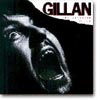

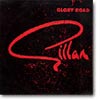
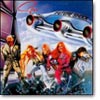
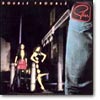





 Gillan
1978-82 CDs on Angel Air :
Gillan
1978-82 CDs on Angel Air :

